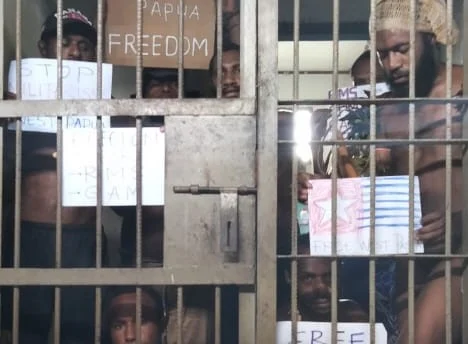Freedom’s Day Without Freedom: The Forgotten Prisoners of West Papua
 |
| Papuan prisoners in an Indonesian prison |
Every August 17, red and white flags flutter across the archipelago.
Fireworks light up the sky. Speeches resound from the steps of government buildings. It is Hari Merdeka—Indonesia’s Independence Day, a celebration of freedom, resistance, and national pride.
And as part of the annual ritual, the state grants remission and releases thousands of prisoners. This year, the gesture was more symbolic than ever—2,606 inmates were released. Among them: 760 convicted in drug-related cases, 16 found guilty of corruption, and 26 labeled as terrorists.
But I could not help wondering: Were any Papuan prisoners among the “terrorists” set free? After all, in Indonesia, Papuans who raise their national flag—the Morning Star—or peacefully call for independence are routinely branded terrorists and jailed.
To find out, I reached out to Markus Haluk, the Executive Director of the United Liberation Movement for West Papua (ULMWP). His answer was stark, but unsurprising:
Not one Papuan freedom fighter has been released.
Not a single activist. Not a single student arrested for distributing leaflets. Not one political prisoner convicted for hoisting a flag. All still behind bars.
Since the beginning of 2023, I’ve been keeping count. More than one hundred Papuans have been arrested for acts that in any democratic society would be seen as expressions of conscience: organizing peaceful protests, circulating tracts, speaking truth to power. Some were beaten. Some disappeared. Others were charged under treason or terrorism laws—laws that erase the line between peaceful dissent and violence, laws that make identity itself a crime.
This is more than injustice. It is a reflection of the deep and festering racism embedded in the Indonesian state's relationship with West Papua.
I speak as someone from a minority group in Indonesia. I have felt the sting of discrimination and abuse. But what I have endured is a mere shadow of the weight carried by my Papuan brothers and sisters. Their pain is daily. Their history is erased. Their resistance is punished. Their humanity is questioned.
And so I ask: What is freedom to Indonesia?
On paper, Indonesia’s independence day commemorates the 1945 proclamation that declared the birth of a nation rooted in justice and equality. But the reality, especially for Papuans, tells a different story: one where the state embraces terrorists and corrupt officials with open arms, while demonizing and imprisoning those who simply ask to be heard.
It is said that a great nation honors its humanitarians and uplifts its defenders of truth. But today, I see a country where silence is rewarded, and courage is criminalized.
Papuan freedom fighters are not terrorists. They are the living conscience of a forgotten struggle. Their flags are not weapons. Their speeches are not bombs. Their only “crime” is daring to believe in a future outside the walls that history and politics have forced upon them.
Until they are free, no celebration of independence in Indonesia will be complete.


Komentar
Posting Komentar